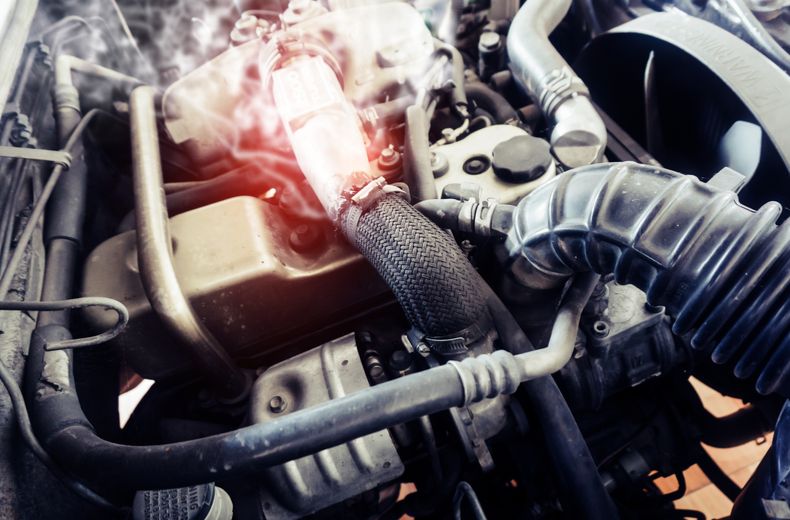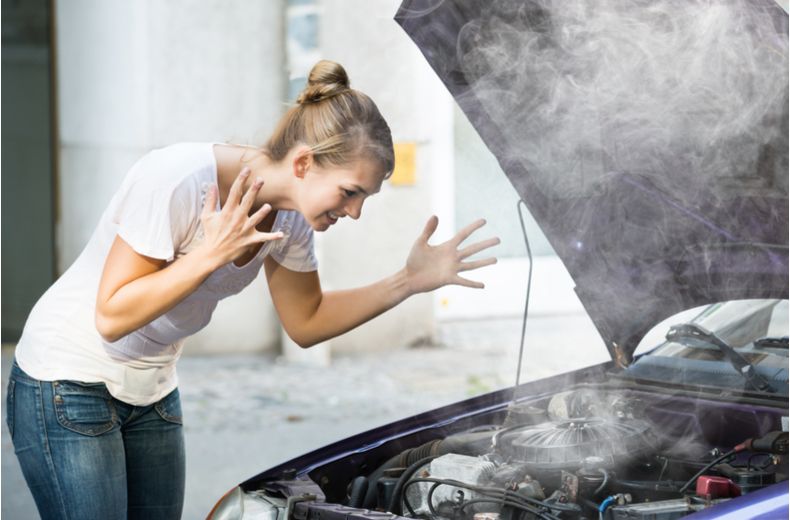All engines get hot due to the internal combustion process, but poor car maintenance or a mechanical problem can result in overheating.
In this guide, we look at the most common causes of engine overheating and what you can do to stop the warning signs and prevent serious damage to your vehicle.
Is your car overheating? Call for a mobile mechanic to carry out a full diagnostic check or take your vehicle to an RAC approved garage.
Why is my car overheating?
There are a number of different reasons your car might be overheating, and certain weather conditions can exacerbate the problem, such as a hot summer’s day where the temperature tops 30C.
Common causes of overheating in a car include:
- A fault with the vehicle’s cooling system linked to the radiator or thermostat
- Low coolant levels caused by a leak or excessive coolant consumption
- Issue with the coolant circulation caused by a faulty coolant pump
- Low engine oil cause by a leak or excessive oil consumption
In Some cases, the overheating could also be a sign of a much more serious issue with your engine or head gasket which you’ll need to get looked at.
What should I do if my car’s overheating?
If you suspect your vehicle is overheating or the temperature car dashboard warning light comes on, it's important to act quickly:
- Pull over to a safe place as soon as possible. If you are on the motorway, leave at the next available exit or pull into a service station
- Switch on your hazard warning lights and turn off your engine
- Get your passengers away from the car and the road. Everyone should leave the car using the left-hand door, wearing hi-vis jackets if you have them
- Open the bonnet if possible. Be aware that the steam may have made your bonnet incredibly hot and you may need to protect your hand
- Leave the engine to sit for at least 30 minutes in order to cool down.
Never remove the radiator cap or expansion tank cap of an overheated engine as it is pressurised and could lead to severe steam burns. If you do open the cap once the engine has cooled, open it slowly and cover your hand for protection.
When the engine has cooled down, check the coolant tank near the radiator.
If it’s empty it could mean you’ve run out or have a leak, so check under the car for signs of leakage like a puddle.
If you need to top up the tank do so with coolant or warm water mixed with coolant.
Avoid filling up with straight water if possible, and never pour cold water into a hot radiator as this could damage your engine.
If the coolant is full, then the issue is likely to be something else mechanical with your engine — either a problem with the cooling system itself or something more serious — which will require professional attention.
If you’re unsure of the problem or what to do, call one of our breakdown patrols who will be able to attend your car on the roadside and offer you friendly, knowledgeable advice about your engine.
The RAC Approved Garage Network provides contacts for those garages that provide quality work and exceptional customer service, giving you peace of mind if your car does needs attention.
How to check your engine coolant
What does the temperature warning light mean?
If the temperature warning light on your dashboard — a small picture of a thermometer — comes on, that could mean your coolant levels are low and could be your first sign of an overheating engine.
When it’s safe to do so, pull over and check your coolant levels, topping up if necessary.
If the temperature gauge on your dashboard has moved into red let your engine cool down for at least 30 minutes before continuing.
If the light comes on again, this could be symptomatic of an issue with your cooling system, so check your car into a garage and get it seen to as soon as possible.
How long will it take my car to cool down after overheating?
If your car’s overheating, pull over, switch off the engine and wait for at least 30 minutes for the engine to cool down.
To be on the safe side, it’s preferable to wait an hour or two to fully let your engine cool.
How can I prevent my engine overheating?
If you’re worried about your car overheating, ensure you have breakdown cover to meet your needs should you be out on the road and the worst happen.
There are also several precautions you can take to protect your car from overheating:
- Keep your car cool in the summer by parking in the shade and using sun screens to keep your interior cool
- Keep an eye on your temperature gauge and coolant levels, adding coolant whenever necessary to a cool engine, and letting your car cool down if needed
- Carry extra coolant in your car so you’re able to fill up your fluid levels as and when needed
- Running the heating on high pumps hot air from the engine into the cabin to keep under bonnet temperatures down. Only do this if it's comfortable to do so
- Check your car in with a mechanic to have your cooling system flushed out and cleaned. Mechanics recommend having this done every 40,000 miles
What damage will my car overheating cause?

An overheating engine shouldn’t cause any lasting damage to your vehicle if you address the problem quickly and safely and seek professional help if the problem with your engine requires it.
However, if you don’t address the issue — by failing to fill up your coolant or fix your cooling system — or choose to continue driving with an overheating car you could end up damaging it and leaving yourself with a hefty repair bill.
Is it safe to drive a car that’s overheating?
If your car engine is overheating then the best thing you can do is to safely pull over and either wait for help to arrive, or for your engine to cool down if you’re confident of being able to fix the issue yourself.
Never continue driving an overheated car as this could cause lasting damage to your engine and could see you paying out more for repairs in the long-run.
Can you call out the RAC without breakdown cover?
Yes. If your car breaks down but you don’t have breakdown cover, you can still call the RAC for breakdown assistance.
Call our hotline on 0333 2000 999 and speak to one of our operators who will be able to set you up on any one of our annual breakdown cover policies immediately.
Please note that for the first 24 hours of your policy you will be put on our Roadside Assistance Only policy.
If your MOT is due or if you would like to book your vehicle in for a full car service, you can book online with your local RAC Mobile Mechanic or RAC Approved Garage today.

RAC sale – up to 33% off*
• Roadside cover from £5.29 a month†
• We get to most breakdowns in 60 mins or less
• Our patrols fix 4/5 breakdowns on the spot














